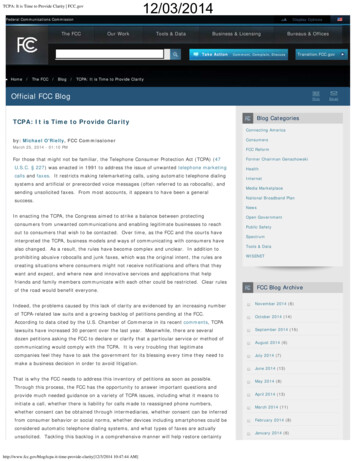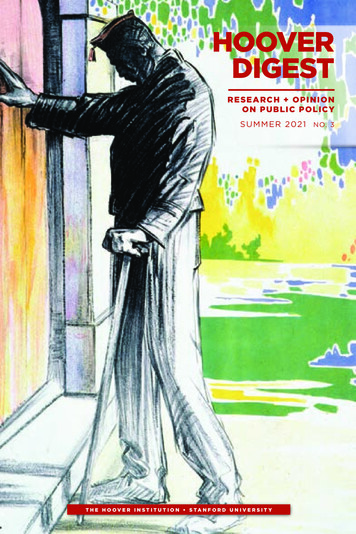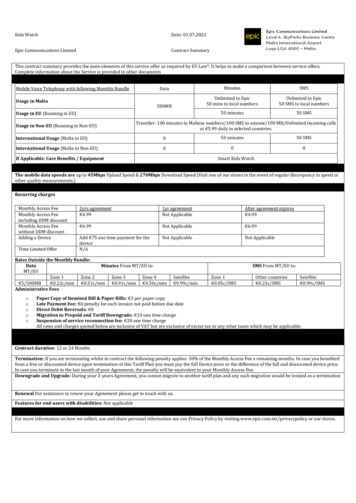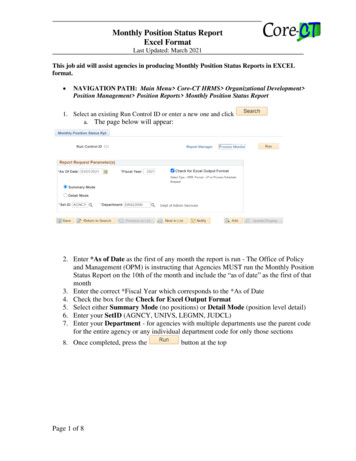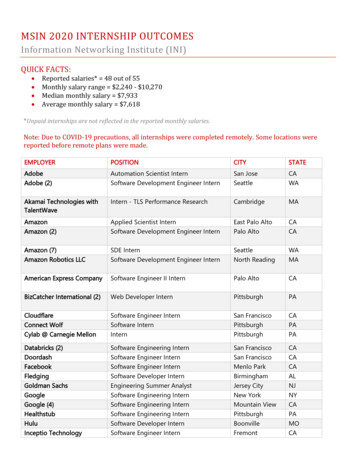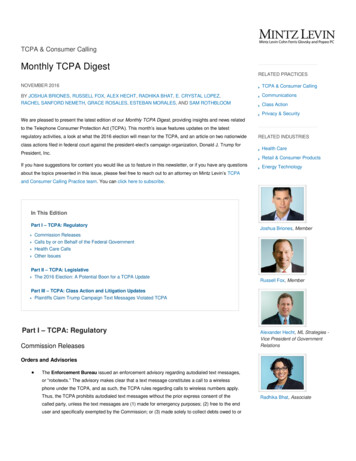
Transcription
TCPA & Consumer CallingMonthly TCPA DigestRELATED PRACTICESNOVEMBER 2016TCPA & Consumer CallingBY JOSHUA BRIONES, RUSSELL FOX, ALEX HECHT, RADHIKA BHAT, E. CRYSTAL LOPEZ,RACHEL SANFORD NEMETH, GRACE ROSALES, ESTEBAN MORALES, AND SAM ROTHBLOOMCommunicationsClass ActionPrivacy & SecurityWe are pleased to present the latest edition of our Monthly TCPA Digest, providing insights and news relatedto the Telephone Consumer Protection Act (TCPA). This month’s issue features updates on the latestregulatory activities, a look at what the 2016 election will mean for the TCPA, and an article on two nationwideclass actions filed in federal court against the president-elect’s campaign organization, Donald J. Trump forRELATED INDUSTRIESHealth CarePresident, Inc.Retail & Consumer ProductsIf you have suggestions for content you would like us to feature in this newsletter, or if you have any questionsEnergy Technologyabout the topics presented in this issue, please feel free to reach out to an attorney on Mintz Levin’s TCPAand Consumer Calling Practice team. You can click here to subscribe.In This EditionPart I – TCPA: RegulatoryJoshua Briones, MemberCommission ReleasesCalls by or on Behalf of the Federal GovernmentHealth Care CallsOther IssuesPart II – TCPA: LegislativeThe 2016 Election: A Potential Boon for a TCPA UpdateRussell Fox, MemberPart III – TCPA: Class Action and Litigation UpdatesPlaintiffs Claim Trump Campaign Text Messages Violated TCPAPart I – TCPA: RegulatoryCommission ReleasesAlexander Hecht, ML Strategies Vice President of GovernmentRelationsOrders and Advisories The Enforcement Bureau issued an enforcement advisory regarding autodialed text messages,or “robotexts.” The advisory makes clear that a text message constitutes a call to a wirelessphone under the TCPA, and as such, the TCPA rules regarding calls to wireless numbers apply.Thus, the TCPA prohibits autodialed text messages without the prior express consent of thecalled party, unless the text messages are (1) made for emergency purposes; (2) free to the enduser and specifically exempted by the Commission; or (3) made solely to collect debts owed to orRadhika Bhat, Associate
guaranteed by the United States, pursuant to certain rules. If the text includes an advertisement,the prior express consent must be written. The fact that a consumer’s wireless number is in thecontact list of another person’s wireless phone does not, by itself, demonstrate consent to receiveautodialed texts. Consumers may also revoke their consent at any time. When a consumer hasrevoked consent to receive future texts, the text sender may immediately send one finalautodialed text to confirm the recipient’s opt-out request. Note that the definition of autodialerE. Crystal Lopez, Associatecovers any equipment that has the capacity to store or produce numbers to be dialed and dialthem without human intervention – but the equipment need not have the present ability to do so –and as such an autodialer may include certain text messaging apps and Internet-to-phone textmessaging technologies. The rule regarding reassigned wireless numbers also applies to texts –i.e., when a caller reasonably relies on prior express consent to text a wireless number and doesnot discover that the number has been reassigned to another party prior to making the text, thecaller is not liable for the first text to the non-consenting party. Forfeiture penalties for robotextsmay be up to 18,936 per violation. Rachel Sanford Nemeth,ML Strategies - Director ofGovernment RelationsThe Consumer and Governmental Affairs Bureau issued an order denying a Petition forExemption submitted by the Mortgage Bankers Association (“MBA”), which asked that theCommission exempt from the TCPA’s prior express consent requirements autodialed andprerecorded residential mortgage servicing calls to wireless numbers, when the calls are notcharged to the called party and do not constitute telemarketing. The Bureau noted that the MBAdid not provide any information on how it would make these calls free to the end user. And, evenif the MBA were able to make the calls free, the public interest in and the need for the timelyGrace Rosales, Senior Analyst andBusiness Relations Specialistdelivery of mortgage servicing calls did not justify setting aside consumers’ privacy interests. TheBureau found that these calls are not particularly time-sensitive – unlike, for instance, calls fromone’s bank regarding fraud or identity theft, for which the Commission has previously provided anexemption. The Bureau noted that mortgage servicers may autodial consumers without anexemption by simply relying on the prior express consent a consumer provides when includingtheir wireless phone number on a mortgage application. As the Commission previously stated, aparty who provides his or her wireless number to a creditor as part of a credit applicationEsteban Morales, Associate“reasonably evidences prior express consent by the cell phone subscriber to be contacted at thenumber regarding the debt.” Mortgage servicers may also obtain new consents by many availablemeans, including by email. Last, the Bureau stated that there is no need for an exemption toharmonize the practices of callers making calls regarding the collection of a debt owed to orguaranteed by a private entity with those of callers making calls regarding the collection of a debtowed to or guaranteed by the United States. If Congress had intended the federal debt collectionSam Rothbloom, Project Analystexemption to apply universally, regardless of who owned or guaranteed a debt, it would havestructured the statutory exemption for these calls accordingly.Other Commission Releases ML STRATEGIESThe Enforcement Bureau signed a Memorandum of Understanding with the Canadian Radiotelevision and Telecommunications Commission (“CRTC”) on mutual assistance and informationexchange for the purpose of enforcing the TCPA and the Canadian Anti-Spam Law. Under theagreement, the FCC and CRTC will cooperate on enforcement and investigative matters relatedto robocalls and caller ID spoofing; exchange information about investigations and complaints;share knowledge and expertise; collaborate on initiatives to promote solutions to unlawfulrobocalls and caller id spoofing; provide information about legal theories and economic analysis;and provide other appropriate assistance. Shared information will be treated as confidential, andfurther disclosure or use of shared information must be with the prior written consent of thesharer.www.mlstrategies.com
The Consumer and Governmental Affairs Bureau announced a webinar on robocalls forconsumers. The webinar will be on December 14, 2016 from 1-2 pm.Calls by or on Behalf of the Federal GovernmentCouncil of Professional Associations on Federal Statistics (“COPAFS”) and NORC at the University ofChicago (“NORC”) representatives met with Consumer and Governmental Affairs Bureau staff to discuss theNational Consumer Law Center’s Petition for Reconsideration of the Broadnet Declaratory Ruling, which asksthe FCC to reconsider its determination that federal contractors acting as agents of the government are notcovered by the TCPA. NORC and COPAFS stressed that (1) the Broadnet Declaratory Ruling advances thepublic interest by ensuring the availability of federal social science surveys that include random sampling forstatistical accuracy; (2) any type of prescriptive mandates on the number of calls or manner of calling wouldbe detrimental to the federal government’s conduct of surveys; and (3) the government has no incentive toharass those who cooperate in voluntary surveys. NORC also supports the Professional Services Council’sPetition for Reconsideration of the Broadnet Declaratory Ruling, which seeks a modification of that portion ofthe ruling necessary to provide TCPA relief to government contractors acting on behalf of the federalgovernment, in accordance with their contract’s terms and the government’s directives, without regard towhether a common law agency relationship exists.Health Care CallsNational Consumer Law Center, Consumer Federation of America, and Consumers Unionrepresentatives met with Consumer and Governmental Affairs Bureau and Office of General Counsel staff todiscuss previous ex parte comments (see prior Monthly Digests) filed by the National Consumer Law Centerand Consumers Union on the Anthem, et al. Petition for Expedited Declaratory Ruling and/or Clarification ofthe TCPA and 2015 TCPA Order.Other IssuesJohn Lennartson and Susan Shay Nohr filed a Petition for Reconsideration of the Consumer andGovernmental Affairs Bureau’s October 2016 order granting a wavier to Papa Murphy’s Holdings, Inc. andPapa Murphy’s International, which allows them to continue to rely on old nonconforming written consents tobe called for the period from October 16, 2013 through 89 days after the 2015 TCPA Order’s release. Thepetition argues that there was no good cause established for granting the waiver and that it was not in thepublic interest. In the alternative, it asks that the FCC affirm that the wavier did not extinguish private statutoryclaims for the period covered by the waiver.bebe stores inc. filed a Petition for Expedited Declaratory Ruling, seeking the same retroactive wavier thatthe Commission granted to the Coalition of Mobile Engagement Providers and the Direct MarketingAssociation in the 2015 TCPA Order, which allowed them to continue to rely on old nonconforming writtenconsents for the period from October 16, 2013 through 89 days after the 2015 TCPA Order’s release.Representatives from PrivacyStar – creator of an app that provides call and text blocking, caller ID, directoryassistance, and assistance with complaint filing with regulatory agencies – met with advisors toCommissioners Clyburn, Pai, and O’Rielly. PrivacyStar discussed its app, noting that PrivacyStar is now amajor source of data for the Federal Trade Commission’s database on fraudulent and other unwanted phonecalls. It further discussed the progress being made by the industry through the Robocall Strike Force andurged the Commission to encourage industry standards setting and to avoid imposing technology mandates.
Part II – TCPA: LegislativeThe 2016 Election: A Potential Boon for a TCPA UpdateBY ALEXANDER HECHT, RACHEL SANFORD NEMETH, AND SAM ROTHBLOOMThe 2016 election may have revealed the folly of prognostication, but one prediction that could still come trueis that Congress will revisit the Telephone Consumer Protection Act (TCPA) next year. In last month’s post,we noted that regardless of which party is in power, Congress likely will address the TCPA but that theelection could affect the aim and scope of possible changes to the law. Republican control in Washington thenext two years increases the odds that Congress passes bills reducing the TCPA’s ambiguity for the businesscommunity. Yet the bills that will have the best chance of becoming law probably will be those that strike thebalance between clarifying the TCPA’s requirements for businesses and strengthening its protections forconsumers. Of note, President-elect Donald J. Trump may have a strong incentive to support updates of theTCPA because (as described below in the litigation section) his own campaign is battling lawsuits based onthe 1991 law.As of now, the three proposals related to the TCPA to watch are the Repeated Objectionable Bothering ofConsumers on Phone (ROBOCOP) Act (S. 3026 and H.R. 4932), The Spoofing Prevention Act (S. 2558) (orthe Anti-Spoofing Act of 2016 (H.R. 2669) as it is known in the House), and an amendment sponsored bySenator Steve Daines (R-MT) to enhance compliance with the TCPA. These measures (which wesummarized here and here) could move in the lame duck – that is, if an impasse in the Senate breaks. Theconventional wisdom before the election was that the Senate would vote on a suite of telecom bills after votingto reconfirm FCC Commissioner Jessica Rosenworcel. However, that assumption then got turned on its headafter President-elect Trump’s surprising victory. Already in jeopardy, Rosenworcel’s prospects further dimmedwhen Senators Ed Markey (D-MA) and Ron Wyden (D-OR) put twin holds on her nomination. According totheir offices, Markey imposed his hold due to Rosenworcel’s opposition to the FCC’s pending rules governingcable set-top boxes, while Wyden imposed his due to Rosenworcel’s opposition to a program expandingaccess among rural Americans to wireless broadband. A day later, the Senators lifted their holds after theyreceived pushback from within their caucus. Now Rosenworcel’s nomination is thought to be in the clear afternews broke yesterday of an agreement between Senate leadership to grant Rosenworcel a floor vote.However, do not hold your breath, as the storyline seems to change by the hour. Should the Senate grantRosenworcel a second term on the Commission, then some telecom bills may make it into a package thatpasses during the lame duck. But given all the moving parts involved, many telecom bills, including thosepertaining to the TCPA, may have to wait in the queue until next Congress.Next Congress, the Senate also will help impanel the FCC and FTC, which both have jurisdiction over theTCPA. Come 2017, the FCC could have a 3-2 Republican majority, a 2-1 Republican majority, or a 2-2partisan split. The makeup of the FCC will depend in part on Rosenworcel’s and Chairman Tom Wheeler’sfutures on the Commission. The two leading candidates rumored to be the next FCC chairman areCommissioner Ajit Pai and Representative Marsha Blackburn (R-TN). Also on the shortlist are Bryan Tramont,Wilkinson Baker Knauer’s managing partner; Peter Thiel, co-founder of PayPal and Palantier Technologies;and Jeffrey Eisenach, an American Enterprise Institute visiting scholar (who currently is leading Trump’stransition of the FCC). These five names are also floated for the slot for the third Republicancommissionership. Over at the FTC, rumored candidates for the chairmanship are Commissioner MaureenOhlhausen and former Commissioner Joshua Wright (who currently is leading Trump’s transition of the FTC).The FTC also will have a 3-2 Republican majority if it has no vacancies.
The other leadership change that could affect the TCPA will be on the House Energy and CommerceCommittee. As we noted in last month’s update, Representatives Greg Walden (R-OR) and John Shimkus (RIL) are the two frontrunners to succeed Chairman Fred Upton (R-MI), who is term-limited. Since then, formerChairman Joe Barton (R-TX) has announced that he too will be seeking the gavel, but the odds appear to beagainst him. Shimkus is thought to be in the lead. However, Walden’s successful chairmanship of the NationalRepublican Congressional Committee could give him the advantage. Both Shimkus and Walden haveexpressed interest in revisiting the TCPA, as have Representatives Marsha Blackburn (R-TN) and Bob Latta(R-OH), the two presumed frontrunners to succeed Walden as the Chairman of the E&C Subcommittee onCommunications and Technology. In the Senate, Senators John Thune (R-SD) and Roger Wicker (R-MS)most likely will chair the Senate Commerce Committee and the Subcommittee on Communications,Technology, and the Internet, while Senators Bill Nelson (D-FL) and Brian Schatz (D-HI) are poised to remainthe committees’ Ranking Members. Like Shimkus and Walden, Thune has indicated his desire to modernizethe TCPA. Given the shared interest among possible committee chairs, the TCPA could be a top priority inboth chambers next Congress.Part III – TCPA: Class Action and Litigation UpdatesPlaintiffs Claim Trump Campaign Text Messages Violated TCPABY JOSHUA BRIONES, CRYSTAL LOPEZ, AND GRACE ROSALESTwo different plaintiffs filed separate TCPA nationwide class actions in federal court in the Northern District ofIllinois against Donald J. Trump for President, Inc. Both plaintiffs allege that the Trump Campaign sent them atext message with the following message: “Reply YES to subscribe to Donald J. Trump for President. Yoursubscription will help Make America Great Again! Msg&data rates may apply.” Both plaintiffs claim that theydid not provide Trump with their express written consent to be contacted. The class in each of the lawsuitswas defined slightly differently, with differences applying to the length of time at issue and parties to whom theclass members provided their phone numbers. The two cases have been consolidated and assigned to thesame judge.First Amendment ChallengeDonald Trump’s presidential campaign recently moved to dismiss the remaining case on First Amendmentgrounds. The campaign argued, among other things, that the TCPA violates the First Amendment’s guaranteeof free speech. The campaign pointed out that Congress amended the cell phone ban in November 2015 toexempt calls relating to government debt, arguing in its motion that this is “preferential treatment” and qualifiesas a “blatant and egregious form of content discrimination.” Apart from this exemption, Trump’s campaign alsoargued that the Federal Communications Commission (“FCC”) created a number of other exemptions,including exemptions for financial institutions and health care providers. The Trump campaign maintained thatthese FCC created exemptions draw “distinctions based on the message a speaker conveys.”The plaintiffs opposed the motion to dismiss and argued that the TCPA “does not target any particular ideas,messages or viewpoints.” Instead, according to the plaintiffs, the TCPA is “aimed at preventing text spammersfrom invading privacy and converting the property of others without their consent.” The plaintiffs asserted thata strict scrutiny analysis is inappropriate because the TCPA regulates commercial speech. A commercialspeech regulation is valid if it justifies a substantial government interest, directly advances that interest, and isnot more extensive than necessary to serve that interest. The plaintiffs also claimed that the Hobbs Act, 28
U.S.C. § 2342(a), deprives the court of jurisdiction to consider any exemptions created by the FCC.There is a long history of First Amendment challenges to the TCPA that courts have viewed skeptically todate. In opposing the Trump campaign’s motion, the plaintiffs cited a substantial number of decisionsdisposing of prior challenges. Although First Amendment challenges to the TCPA have failed in the past,Trump’s campaign pointed out in its reply that all of those cases were decided before 2014. Trump’scampaign argued that the distinction is critical because the FCC created new exemptions for financialinstitutions and health care providers in June 2015 and Congress amended the TCPA to exempt calls relatingto government debt in November 2015. Indeed, there have been a number of other recent First Amendmentchallenges to the TCPA based in part on these new exemptions created by the FCC and Congress. It remainsto be seen whether the Trump campaign’s First Amendment challenge will meet with more success thanprevious First Amendment challenges to the TCPA.Legislative ChangesA bigger question is whether Congress will work with President Trump to effect legislative change on keyissues like TCPA reform. The ongoing litigation may well cause Trump to directly address the statute. TheFCC’s directors are appointed by the President, approved by the Senate, and serve five-year terms. And allfive of them will come up for appointment within Trump’s term in office. Commissioner Pai and Rosenworcel’sterms are up in May 7, 2017 and the remainder of the Commissioners, including Chairman Wheeler, end theirterms in November 2018. If Trump cannot obtain help on the legislative front from Congress, he may backdoorTCPA reform via new FCC appointees. The United States Supreme Court is also in play as Trump may havethe chance to appoint a few (or even several) justices, as the average age of the Supreme Court justices isnow over 69 years. Importantly, with the FCC’s TCPA Omnibus ruling on appeal to a feisty DC Circuit Court ofAppeals, there is a good chance that the Supreme Court might be touching on TCPA issues in the next fewyears.About Our TCPA & Consumer Calling PracticeIn an economy where timely and effective communication with both current and prospective customers is vitalto the success of nearly every business, modern technology, such as autodialers, recorded and artificial voicemessages, text messaging, and e-mail provide companies the ability to reach large numbers of people withincreasingly smaller up-front costs. But, companies cannot afford to overlook the hidden costs of using thesemass communication methods if the many regulations that govern their use are not carefully followed.Companies have been hit with class action lawsuits under the Telephone Consumer Protection Act (TCPA) fortens or even hundreds of millions of dollars. Mintz Levin's multidisciplinary team work tirelessly to help ourclients understand the ever-changing legal landscape and to develop workable and successful solutions.TCPA rules can apply to certain non-sales calls, such as a recorded call to employees about a new workschedule or a text to customers about a new billing system. We advise on how to set up calling campaignsthat meet state and federal requirements as well as how the Federal Communications Commission and theFederal Trade Commission apply their rules on calling, faxing, and texting. Given the uncertaintiessurrounding the TCPA as a result of the FCC's extensive and confusing rulings, we work with clients acrossmany industries, health care, retail, communications and financial services, on matters relating to the followingissues:Compliance: Our TCPA team routinely advises companies on compliance with federal and state sales and
marketing requirements. We also know what type of consumer consent is needed for each type of call andhow specific consents must be worded. We know when and how to apply a do-not-call list and when and howan opt-out provision must be afforded.Consumer class action defense: We've been called upon to handle TCPA class actions across all industriesand in federal courts across the nation. Our seasoned litigators know the serial plaintiffs and counsel well andare unfazed by their schemes. Fortunately for our clients, our team has succeeded in winning at the motionstage or earlier in the vast majority of TCPA matters we have defended. That is what truly sets us apart. And ifa case must go to trial, we have the experience and strength to follow it to the end.Insurance coverage disputes: We know the arguments insurers use to deny coverage in TCPA suitsbecause we've defended against them. More important, we have a long track record of convincing carriers tofund the defense of these actions and, in some cases, to pay significant portions of settlements. Our goal is tohelp secure insurance protection and to see to it that carriers make good on their coverage obligations when aclaim arises.Copyright 2015 Mintz, Levin, Cohn, Ferris, Glovsky and Popeo, P.C.6144-TCPA
Part II - TCPA: Legislative The 2016 Election: A Potential Boon for a TCPA Update BY ALEXANDER HECHT, RACHEL SANFORD NEMETH, AND SAM ROTHBLOOM The 2016 election may have revealed the folly of prognostication, but one prediction that could still come true



